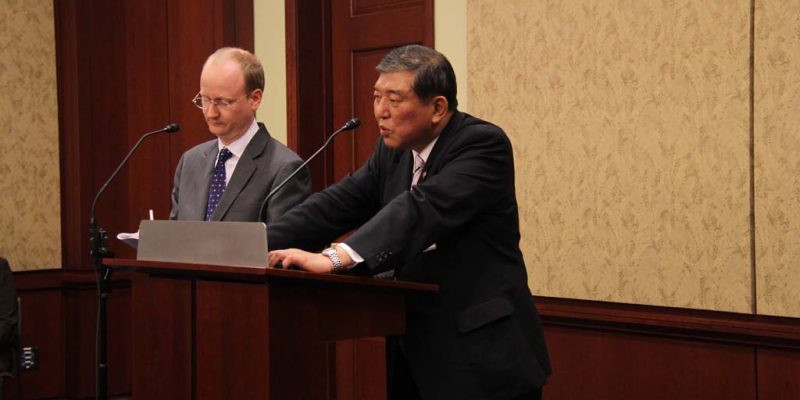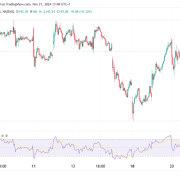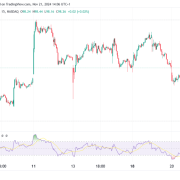
Shigeru Ishiba, a seasoned moderate politician, will be Japan’s next prime minister after winning the leadership election of the governing Liberal Democratic Party (LDP).
The 67-year-old former defense minister secured victory over his right-wing rival, Sanae Takaichi, by 215 votes to 194 in a runoff election held at the LDP headquarters in Tokyo.
Ishiba’s election marks the end of Fumio Kishida’s tenure as prime minister, who chose not to seek re-election amid low approval ratings and fundraising scandals.
Outgoing prime minister Kishida highlighted the need for fresh leadership following a challenging period for the party.
He urged the next prime minister to lead a “new LDP,” and in his victory speech, Ishiba echoed the sentiment, saying:
We will put an end to the widespread distrust in the LDP. Once the election is over, we will put our hearts into protecting Japan, local areas, rules, and the people of Japan.
The yen strengthened to as much as 142.8 against the dollar from around 146.10 just before the announcement, while benchmark bond yields fell.
Who is Shigeru Ishiba?
Shigeru Ishiba is a well-known figure in Japanese politics, particularly for his expertise in defense policy.
Having previously served as defense minister and agriculture minister, Ishiba has run for the LDP’s top job four times but failed to secure the leadership until now.
He is a strong advocate for Taiwan’s democracy and has called for reforms to the Japan-US security alliance.
One of his key proposals is the establishment of an Asian version of NATO, a multilateral security agreement that would serve to balance the region’s power dynamics.
He has also called for the establishment of a disaster management agency in one of the world’s most disaster-prone countries.
While Ishiba enjoys significant public popularity, his victory is seen as a departure from the political legacy of the late Shinzo Abe, Japan’s former leader.
Abe’s ally, Sanae Takaichi, represented continuity with Abe’s economic policies and historical views, but Ishiba’s win signifies a shift toward more moderate governance.
Yu Uchiyama, a politics professor at the University of Tokyo, noted in Al Jazeera that Ishiba’s “fair and square” approach resonated with the public at a time of political scandals and economic concerns.
Ishiba’s promises and challenges facing him
Ishiba’s leadership will be defined by his efforts to address both domestic and international challenges.
He faces the task of navigating regional security threats, including China’s growing maritime assertiveness and North Korea’s missile programs.
Japan’s defense strategy under Ishiba will likely focus on deterring China’s expansion while maintaining diplomatic channels to avoid escalation.
One of Ishiba’s more ambitious proposals is the formation of an Asian NATO, though this idea has garnered limited support in both Tokyo and Washington.
As Ryosuke Hanada, a scholar at Macquarie University, noted in the EastAsiaForum,
The idea may be more viable in the long-term, but it is a pot of gold at the end of the rainbow. Ishiba stands in contrast to this with Takaichi, labelled as an ultra-conservative, who adheres to a more realistic view that keeps the United States engaged in a free and open Indo-Pacific.
Instead, Japan under Ishiba may continue to bolster its ties with the US in pursuit of maintaining a free and open Indo-Pacific, he said.
In terms of economic policy, Ishiba has expressed concerns about Japan’s prolonged period of monetary easing and the challenges posed by rising living costs.
He has questioned the Bank of Japan’s aggressive interest rate policies, which have contributed to a weakened yen.
As a former agriculture minister, Ishiba also emphasizes the importance of revitalizing rural areas that have been struggling with depopulation.
Impact of Ishiba’s election as PM on markets and economy
Ishiba’s election as PM prompted an about-turn in markets that had been betting on a weaker yen materializing from a Takaichi win.
The yen strengthened to as much as 142.8 against the dollar from around 146.10 just before the announcement, while benchmark bond yields fell.
Taro Kimura, economist at Bloomberg Economics, said,
The yen’s surge after Japan’s ruling Liberal Democratic Party picked Shigeru Ishiba to be its next leader speaks volumes about the economic policies he’s likely to take — moving toward a more balanced budget and supporting the Bank of Japan’s move to normalize interest rates.
Experts said Ishiba’s appointment does not signal major changes in the country’s economic policies for now.
Seisaku Kameda, a former BOJ chief economist who is currently executive economist at Sompo Institute Plus said in the Bloomberg report,
“Financial markets have been nervous over the result of the leadership election but now we know the result and that doesn’t indicate a big shift in Japan’s economic policies.”
Ishiba’s promises to foster a “fairer and kinder Japan” reflect a desire to distance his administration from the scandals that plagued his predecessor.
However, the road ahead for Ishiba will not be easy. He must address mounting public dissatisfaction over economic issues, all while contending with an unpredictable regional security environment.
The post Shigeru Ishiba set to become Japan’s next PM: Yen strengthens against USD, bond yields decline appeared first on Invezz











